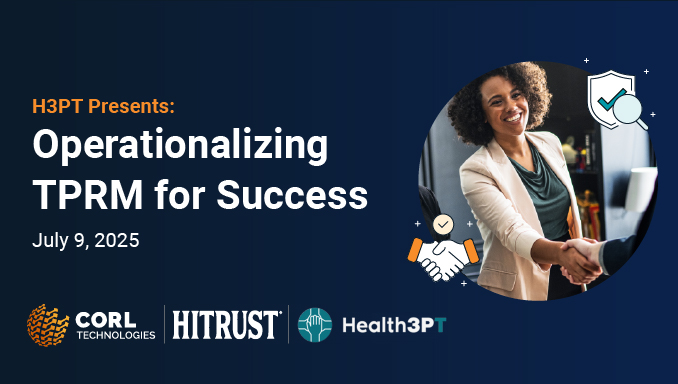
BlogTPRM
Top 10 Healthcare Supplier Risk Management Challenges Facing Providers in 2025
3 Minute Read
Read Top 10 Healthcare Supplier Risk Management Challenges Facing Providers in 2025Compliance
By CORL Technologies | June 24, 2025
Vendor risk in healthcare isn’t one size fits all. From mission critical SaaS platforms to niche medical device startups, every third party presents a different threat profile. CORL Technologies solves that complexity with an arsenal of purpose-built assessments that meet vendors where they are—without drowning your security, compliance, or procurement team in unnecessary questions.
Below is a closer look at each assessment type, the problems it solves, and the unique value it delivers:
Purpose: a quick, 17question scoping survey run before any of the in-depth assessments (except CORLCleared).
Value add: it routes each vendor to the right questionnaire on the first try, trimming days off the intake cycle and avoiding rework.
Ideal for: Critical and high-impact vendors that handle sensitive data (e.g., PHI, PII, PCI) or support mission-critical clinical or business operations.
Why it matters
Differentiator: Integrates the rigor of the NIST Cybersecurity Framework, CIS, and insights from the latest breach data and emerging threats.
Ideal for: Critical vendors that already maintain mature security programs
Why it matters
Differentiator: Uses outcome driven indicators (ODIs) rather than raw control counts, producing an executive ready risk posture snapshot in a single page.
Ideal for: Connected medical devices, including embedded software and IoT-enabled clinical technologies
Why it matters
Differentiator: Purpose-built for the unique risks of medical devices in third-party risk management, this assessment draws on deep expertise from our security team and collaborations with medical device manufacturers, IoT partners, and leading industry frameworks and standards.
Ideal for: Vendors offering software products, mobile applications, or on-premise solutions—including physical devices and installable tools.
Why it matters
Differentiator: Delivers a focused, product-centric assessment that evaluates how a solution will be implemented in your environment—helping identify where compensating controls may be needed and where configurations should be fine-tuned for secure deployment.
Ideal for: Moderate to low impact vendors with limited data scope
Why it matters
Differentiator: Delivers practical, right-sized security hygiene verification that balances thoroughness with the level of effort required from smaller vendors.
Ideal for: Vendors in the gray zone between CIS and full VSQ depth
Why it matters
Differentiator: Acts as an option to compromise between the full sized VSQ and something lightweight like the CIS.
Ideal for: Solutions deployed within hospital data centers or local networks
Why it matters
Differentiator: Includes “Day2 Operations” scenarios (power loss, network segmentation, emergency access) to assess real world resilience.
NIST-based bolt-ons (13–22 questions) that can be appended to any CORL assessment, depending on whether you’re evaluating the vendor’s organization or a specific AI-powered product or service.
Value add: keeps the core questionnaire lean while letting you zoom in on data provenance, bias controls, and model monitoring only when AI is actually in scope.
Ideal for: Vendors providing or embedding AI/ML functionality
Why it matters
Differentiator: Introduces an “Explainability Index” that scores how transparently a model’s predictions can be traced and justified—vital for clinician trust.
| Assessment | Ideal For | Question Count | Key Differentiators |
| VSQ (Vendor Security Questionnaire) | High impact vendors handling PHI/ePHI or core clinical workflows | ~242 | NIST 80053 Rev 5 + CIS v8 + Verizon DBIR insights; heat mapped clinical impact scoring |
| CORLCleared | Mature, critical vendors with existing attestations | ~57 | Outcome driven indicators, reciprocity engine, single one stop review |
| Medical Device Questionnaire | Connected medical devices & digital therapeutics | ~50 | FDA pre & post market alignment; “Clinical Safety Lens” weighting |
| PSQ (Product Security Questionnaire) | Software/mobile apps, on‑prem or cloud | ~34 | Security by Design focus, vulnerability management and patching, implementation focus |
| CIS Questionnaire | Moderate & low impact vendors | ~55 | CIS v8 Tier 1–2 hygiene, sub‑1‑hour completion time |
| NIST 171 | Vendors between CIS & VSQ depth; federal overlap | ~180 | 180 controls across critical domains |
| On Premise Questionnaire | Solutions deployed in hospital data centers | ~35 | Physical + logical safeguards; “Day‑2 Operations” scenarios; pairs naturally with PSQ |
| AI Questionnaire | Vendors providing/using AI or ML | Base plus AI Supplemental (13–22 questions) | Explainability Index, bias mitigation, model drift monitoring; plugs into VSQ or NIST 171 |
Instead of baking AI questions into every survey, CORL offers two NIST based bolt‑-‑ons (organizational vs. product/service level). You attach them only when AI is truly in scope—keeping core questionnaires lean while still drilling into bias controls, data provenance, and monitoring discipline when it matters.
| Scenario | Recommended Combo | Why It Works |
| On‑prem software appliance | PSQ + On‑Premise | Covers build security and local operational safeguards in one pass |
| Highly certified SaaS with SOC 2 & ISO 27001 | CORLCleared (solo) | Leverages existing attestations; no redundant questionnaires |
| AI powered EHR plugin | VSQ + AI Supplemental (Product) | Deep security dive plus targeted AI risk analysis |
| Startup handling limited de‑identified data | CIS | Rightsized hygiene check without enterprise grade overhead |
Need something tailored to your exact control set or niche workflow? We’ve got you covered. CORL’s platform lets you build fully custom questionnaires from the ground up—or remix any of the existing ones—so you can zero in on the risks that matter most to your organization. Partner with one of our seasoned security advisors, outline the regulatory drivers or operational nuances you need to capture, and we’ll spin up a bespoke assessment that plugs seamlessly into the same dashboards and scoring engine. You get the precision of a homegrown survey without sacrificing the speed, analytics, or vendor friendly experience CORL is known for.
Vendor ecosystems evolve daily—IoT, AI, decentralized apps, hybrid deployments. CORL Technologies’ differentiated, workflow aware assessment library keeps pace, empowering healthcare risk teams to allocate scrutiny where it counts and free up cycles everywhere else. The result? Stronger security, lower onboarding friction, and ultimately, safer patient care.
Ready to calibrate your vendor risk program? Reach out to CORL Technologies to see how these assessments plug directly into your existing workflows and GRC tooling.
 CORL Technologies
CORL Technologies
CORL transforms TPRM chaos into clarity
CORL is a leading provider of vendor risk management solutions for the healthcare industry. CORL gets results by scaling organizational and vendor risk programs through our healthcare vendor risk clearinghouse solution, dashboard reporting that business owners can understand, and proven workflows that drive measurable risk reduction. CORL accelerates the speed of vendor risk assessments and holds vendors accountable for remediating risk exposures.
Related Posts

BlogTPRM
By CORL Technologies | August 14, 2025
3 Minute Read
Read Top 10 Healthcare Supplier Risk Management Challenges Facing Providers in 2025
BlogTPRM
By CORL Technologies | May 19, 2025
2 Minute Read
Read More Than a Checkbox: Why Right-Sizing Vendor Risk Remediation Is the Key to Smarter TPRM
BlogCompliance
By CORL Technologies | April 23, 2025
2 Minute Read
Read The Power of Human + AI: CORL’s Differentiated Approach to Healthcare Risk Management
Webinars
WEBINAR H3PT Presents: Operationalizing TPRM for Success Join us for a focused, real-world conversation with healthcare security and risk leaders tackling today’s most pressing TPRM challenges. This session will bring together a small panel of experts for an insightful discussion on how to strengthen third-party risk programs in an evolving threat landscape. This won’t be […]